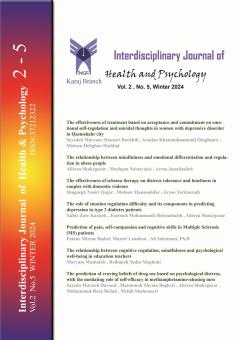The effectiveness of treatment based on acceptance and commitment on emotional self-regulation and suicidal thoughts in women with depressive disorder in Qaemshahr city. (Authors: Seyedeh Maryam Mousavi Borkhili / Arsalan Khanmohammadi Otaghsara / Mohsen Dehghan Haddad)
Subject Areas : Psychological Interventions for Medical Conditions
Keywords: treatment based on acceptance and commitment, emotional self-regulation, suicidal thoughts, depressive disorder,
Abstract :
Abstract The aim of the present study was the effectiveness of acceptance and commitment therapy on emotional self-regulation and suicidal thoughts in women suffering from depression in Qaimshahr city. The research method was semi-experimental with a pre-test-post-test design with a control group. The statistical population of the present study included all women suffering from depression in 1401-1402, who referred to the psychology and micro-counseling center in Qaemshahr city for counseling. 30 women were selected by available sampling and randomly assigned to two experimental (15 people) and control (15 people) groups. Beck's depression questionnaire (1996), Beck's suicidal thoughts (1979) and Hoffman and Kashden's emotional self-regulation (2010) were used to collect data. The people of the experimental group underwent therapeutic sessions based on acceptance and commitment by Walls and Sorel (2007) in the form of 8 90-minute sessions. In order to analyze the data, descriptive (mean, standard deviation) and inferential (multivariate covariance analysis) methods were used with SPSS version 25 software. Based on the results of the treatment based on acceptance and commitment, it was effective on the linear combination of variables of suicidal thoughts and emotional self-regulation of women with depression. In other words, treatment based on acceptance and commitment led to the reduction of suicidal thoughts and emotional self-regulation with the strategy of concealment and the increase of emotional self-regulation with the strategy of work compromise and tolerance in women suffering from depression.
منابع
شاره حسین و رباطی زهرا. (1400). اثربخشی گروهدرمانی مبتنی بر پذیرش و تعهد بر انعطافپذیری شناختی، افکار خودکشی، افسردگی و ناامیدی در سربازان. مجله روانپزشكي و روانشناسي باليني ايران .۲۷ (۴) ، ۴۲۷-۴۱۲
فیض اللهی، سارا؛ نریمانی، محمد و موسی زاده، توکل. (1400) بررسی اثربخشی درمان مبتنی بر تعهد و پذیرش بر میزان افکار خودکشی، خودنهان¬سازی و تنظیم شناختی هیجان در زنان دارای افکار خودکشی.رویش روش شناسی. 10(2)، 69-79
Anisi, J., Fathi Ashtiani, A., Salimi, SH., Ahmadi Noudeh, Kh. (2005).Validity and reliability of Beck Suicide Scale Ideation (BSSI) among soldiers. Journal of Military Medicine. 7(1), 33-7.
Arditi-Arbel, B., Hamdan, S., Winterman, M., Gvion, Y. (2023) Suicidal ideation and behavior among perinatal women and their association with sleep disturbances, medical conditions, and known risk factors. Front. Psychiatry 13. 987673
Atlasi, R., Narimani, M., Musa zadeh, T. (2014). Comparison of the effectiveness of de-dysmation therapy with eye movement and re-rehabilitation with metacognitive therapy on self-control in patients with panic attacks. Journal of Behavioral Sciences. 8(3), 269–263.
Bagheri-Sheykhangafshe, F., Kian, A., Savabi-Niri, V., Aghdasi, N., Bourbour, z. (2022).The Efficacy of Acceptance and Commitment Therapy on Psychological Capital and Emotion Regulation of Students with Suicidal Ideation. International Journal of Behavioral Sciences. 16(2), 96-102
Basha, E., Mengistu , B., Engidaw , N (2021). Suicidal Ideation and Its Associated Factors Among Patients with Major Depressive Disorder at Amanuel Mental Specialized Hospital, Addis Ababa, Ethiopia. Neuropsychiatr Dis Treat. 17. 1571–1577.
Baumeister, R. F. (1998). The self. In D. Gilbert, S. T. Fiske, & G. Lindzey (Eds.),Handbook of social psychology (4th ed., Vol. 1, pp. 680-740). New York: McGraw-Hill.
Beck, AT., Steer, RA., Brown, GK. (1996). Manual for the Beck Depression Inventory-II. San Antonio: The Psychological Corporation;. https://www.nctsn.org/measures/beck-depression-inventory-second-edition
Bond, C.(2019). The effects of a brief intervention workshop on emotional regulation and well-being: stress, happiness and depressive symptoms. Psychology. 195557902
Chew, H., Chng, S., Rajasegaran, N., Choy, K., & Chong, Y., (2023). Effectiveness of acceptance and commitment therapy on weight, eating behaviours and psychological outcomes: a systematic review and meta-analysis. Eating and Weight Disorders - Studies on Anorexia, Bulimia and Obesity. 10;28(1):6
Davies, C. D., Niles, A. N., Pittig, A., Arch, J. J., & Craske, M. G. (2015). Physiological and behavioral indices of emotion dysregulation as predictors of outcome from cognitive behavioral therapy and acceptance and commitment therapy for anxiety. Journal of behavior therapy and experimental psychiatry, 46, 35-43
Davies, CD., Niles, AN., Pittig, A., Arch, JJ., Craske, MG. (2015) Physiological and behavioral indices of emotion dysregulation as predictors of outcome from cognitive behavioral therapy and acceptance and commitment therapy for anxiety. J Behav Ther Exp Psychiatry.46. 35-43.
Ducasse, D., René, E., Béziat, S., Guillaume, S., Courtet, P., & Olié, E. (2014). Acceptance and commitment therapy for management of suicidal patients. Psychotherapy and psychosomatics, 83(6), 374-376
Ducasse, D., Rene, E., Beziat, S., Guillaume, S., Courtet, P., Olie, E. (2014). Acceptance and commitment therapy for management of suicidal patients: a pilot study. Psychother Psychosom. 83. 374–376.
Grothe, KB., Dutton, GR., Jones, GN., Bodenlos, J., Ancona, M., Brantley, PJ. (2005). Validation of the Beck Depression Inventory-II in a low-income African American sample of medical outpatients. Psychological Assessment. 17(1), 110-4.
Hayes, S. C., Strosahl, K. D., Wilson, K .G. (2012). Acceptance and Commitment Therapy: The process and practice of mindful change. New York: Guilford Press
Herwig, U., Opialla, S., Cattapan, K., Wetter, T. C., Jancke, L., Bruhl, A. B. (2018). Emotion introspection and regulation in depression. Psy. Res. Neuro. 277, 7–13.
Hulbert‐Williams, N. J., Storey, L., & Wilson, K. G. (2015). Psychological interventions for patients with cancer: Psychological flexibility and the potential utility of Acceptance and Commitment Therapy. European Journal of Cancer Care, 24(1), 15–27
Joormann, J., Stanton, C. H. (2016). Examining emotion regulation in depression: A review and future directions. Behav. Res. Ther. 86, 35–49. :
Kapci, EG., Uslu, R., Turkcapar, H., Karaoglan, A. (2008). Beck Depression Inventory II: Evaluation of the psychometric properties and cut- off points in a Turkish adult population. Depression and Anxiety; 25(10),E104-10.
Koo, K., Kim, K (2020). Effects of Physical Activity on the Stress and Suicidal Ideation in Korean Adult Women with Depressive Disorder. Int J Environ Res Public Health, 17(10), 3502.
Lövestad, s., Löve, J., Vaez, M., Waern, M., Hensing, G., Krantz, G. (2019). Suicidal ideation and attempts in population-based samples of women: temporal changes between 1989 and 2015. BMC Public Health. 19,351
Luoma, J. B., & Villatte, J. L. (2012). Mindfulness in the treatment of suicidal individuals. Cognitive and behavioral practice, 19(2), 265-276.
Morrish, L., Rickard, N., Chyuan Chin, T., Vella-Brodrick, DA. (2018).Emotion regulation in adolescent well-being and positive education. Journal of Happiness Studies. 19.1543–1564.
Otte, C., Gold, SM., Penninx,B.W., Pariante, CM., Etkin, A., Fava, M., Mohr, DC., Schatzberg, AF. (2016). Major depressive disorder. Nat Rev Dis Primers, 2:16065
Ruiz, F. J., Flórez, C. L., García-Martín, M. B., Monroy-Cifuentes, A., Barreto-Montero, K., García-Beltrán, D. M., ... & GilLuciano, B. (2018). A multiple-baseline evaluation of a brief acceptance and commitment therapy protocol focused on repetitive negative thinking for moderate emotional disorders. Journal of Contextual Behavioral Science, 9, 1-14
Shareh, H., Robati, Z. (2022).Effect of Acceptance and Commitment Group Therapy on Cognitive Flexibility, Suicidal Ideation, Depression, and Hopelessness in Conscripts. IJPCP; 27 (4) :412-427
Sloan, E., Hall, K., Moulding, R., Bryce, S., Mildred, H., Staiger, PK. (2017). Emotion regulation as a transdiagnostic treatment construct across anxiety, depression, substance, eating and borderline personality disorders: A systematic review. Clin Psychol Rev. 57:141–63.
Spidel, A., Lecomte, T., Kealy, D., & Daigneault, I. (2018). Acceptance and commitment therapy for psychosis and trauma:Improvement in psychiatric symptoms, emotion regulation, and treatment compliance following a brief group intervention. Psychology and Psychotherapy: Theory, Research and Practice, 91(2), 248-261
Stefan-Dabson, K., Mohammadkhani, P., Massah-Choulabi, O. (2007). Psychometrics characteristic of Beck Depression Inventory-II in patients with major depressive disorder . Archives of Rehabilitation. 2007; 8:80-6.
Taheri, A., Foroughi, A., Mohammadian, Y., et al (2020). The Effectiveness of Acceptance and Commitment Therapy on Pain Acceptance and Pain Perception in Patients with Painful Diabetic Neuropathy: A Randomized Controlled Trial. Diabetes Ther.11(8),1695-1708
Vowles, KE., Sorrell, JT. (2007). Life with chronic pain: An acceptance-based approach (therapist guide and patient workbook). Unpublished manuscript.
Wegner, M., Amatriain-Fernández, S., Kaulitzky, A., Murillo-Rodriguez, E., Machado, S., Budde, H. (2020). Systematic review of meta-analyses: Exercise effects on depression in children and adolescents. Front. Psychiatry,11:81.
World Health Organization. (2019).Suicide. https://www.who.int/news-room/fact-sheets/detail/suicide. Accessed 2 Sept 2019.
Zettle, R. D., Rains, J. C., Hayes, S. C. (1989).Processes of change in Acceptance and Commitment Therapy and Cognitive Therapy for depression: A mediational reanalysis of Zettle and Rains. Behavior Modification. 35(3):265–276
Zhang, J., Brown, GK. (2007). Psychometric properties of the scale for suicide ideation in China. Archives of Suicide Research. 11(2), 203-10.
Zhang, J., Zhang, M., He, K., Jiang, Y., Wang, R. (2022). Relationship between College Students' Frustration and Suicidal Thoughts. China Journal of Health Psychology, 24 (03), 450- 454

